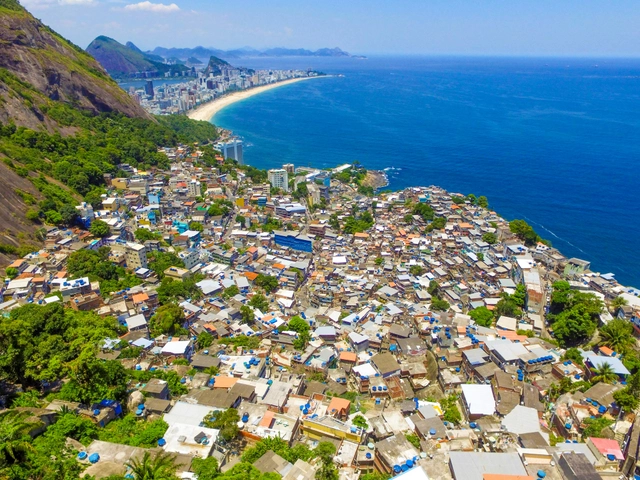Favelas of Brazil
A comprehensive guide to the communities and complexities of Brazil's favelas
1. What Are Favelas?
Favelas are informal settlements found in Brazil, known for their unique culture, tight-knit communities, and often challenging living conditions. These neighborhoods are often located on the outskirts of major cities like Rio de Janeiro and São Paulo.
- Origins and History: Favelas emerged in the late 19th century as former slaves and rural migrants sought work in urban areas but could not afford housing. Over time, these areas grew as people built their own homes using available materials.
- Geographical Characteristics: Favelas are commonly found on hillsides or unused land within or near urban centers, often lacking in formal infrastructure like sewage and water systems. This contributes to the challenges residents face in accessing services.
2. Life in a Favela
Despite economic challenges, favelas are known for their vibrant cultures, resilience, and close-knit communities. Daily life involves navigating both the hardships and unique cultural richness these communities offer.
- Community Spirit: People in favelas often share a strong sense of community and mutual support. Neighbors rely on one another for resources, help with daily tasks, and provide a safety network amid socioeconomic difficulties.
- Education and Work: Residents often face challenges in accessing quality education and formal employment. Many work in informal sectors, and community-led initiatives sometimes fill gaps in education through after-school programs.
- Culture and Identity: Favelas are cultural hubs, famous for their music, dance, and art. Samba and funk music are popular, and many talented artists and musicians have emerged from these neighborhoods.
3. Socioeconomic Challenges
Favelas face significant challenges, including poverty, limited access to public services, and high levels of violence. These challenges are closely linked to Brazil's broader socioeconomic inequalities.
- Poverty and Unemployment: Poverty is widespread in favelas, with many residents working in low-paying, informal jobs. High unemployment rates are common, limiting social mobility and access to economic resources.
- Health and Sanitation: Many favelas lack proper sanitation infrastructure, making residents vulnerable to health issues. Inadequate healthcare services further exacerbate these challenges.
- Violence and Safety: Favelas are often associated with violence, partially due to the presence of drug trafficking. Police operations in favelas are frequent and can be intense, sometimes impacting innocent residents.
4. Government Policies and Public Services
Government responses to favelas have varied over the years, ranging from relocation programs to community support initiatives aimed at improving conditions and reducing poverty.
- Public Infrastructure Projects: Programs like 'PAC' (Program for Accelerated Growth) aim to improve infrastructure by providing better sanitation, roads, and public spaces in favelas.
- Housing Programs: Government-led housing initiatives, like 'Minha Casa Minha Vida,' attempt to relocate families from favelas into more formal housing, although the effectiveness and sustainability are debated.
5. Education in Favelas
Educational resources are often limited in favelas, yet residents show resilience in pursuing opportunities for learning, often supported by non-profit organizations.
- Limited School Access: Schools in or near favelas often have limited resources, leading to larger class sizes, fewer materials, and a lack of extracurricular activities.
- Community Learning Centers: Local community centers often provide educational resources, including classes, library access, and job training, helping bridge educational gaps.
6. Health and Sanitation in Favelas
Favelas face serious health challenges due to overcrowded living conditions and limited access to healthcare and sanitation facilities.
- Public Health Risks: Overcrowding and inadequate sanitation systems can lead to health issues like infectious diseases. Limited access to clean water exacerbates these problems.
- Healthcare Access: Healthcare access is often limited, with residents depending on public hospitals that may be overburdened and understaffed.
7. Crime and Security in Favelas
Many favelas struggle with crime, often related to drug trafficking. The situation is complex, involving both social factors and law enforcement challenges.
- Drug Trafficking: Drug gangs often operate within favelas, creating a challenging environment for residents. Some youth are drawn into trafficking due to limited economic opportunities.
- Police Operations: Frequent police operations aim to control violence but can sometimes lead to clashes with residents, raising concerns over human rights and the safety of civilians.
8. Tourism in Favelas
Favela tourism has grown in popularity, allowing visitors to see another side of Brazilian life. This practice, however, is controversial.
- Economic Benefits: Some favela residents benefit economically from tourism, working as guides or selling crafts, which helps provide additional income for the community.
- Ethical Concerns: Favela tourism can be controversial, as some argue it exploits poverty. Tourists should consider their impact and choose ethical tour providers that benefit the community.
Summary
- Favelas are informal settlements in Brazil with rich culture and unique social structures, though facing challenges in areas like sanitation and education.
- Government programs aim to improve infrastructure in favelas, though results are mixed.
- Community life is often strong, with residents forming support networks despite economic hardships.
- Healthcare, crime, and police interactions are key concerns within favelas.
- Favela tourism brings both economic benefits and ethical questions.
References
- - Favela History and Development (World Atlas)
- - Life in Brazilian Favelas (National Geographic)
- - Challenges in Favelas (World Bank)
- - Public Policy and Favelas (Brazilian Government Publications)
- - Education in Brazilian Favelas (Education Journal)
- - Health in Favelas (Public Health Studies)
- - Crime in Favelas (Journal of Urban Studies)
- - Favela Tourism (Tourism Review)
keywords: favelas; Brazil; communities; urban challenges; socioeconomics.
Partner Suggestion
Best Photography Tips

